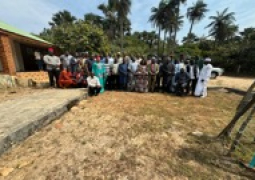At the forum, Ousman Touray, who spoke on behalf of FAO Representative, reminded that the onion disease is highly contagious and spreads rapidly with incidences observed at both field and storage levels.
“There is currently no formal study on onion bulb rot to determine the pathogen and other contributing factors responsible for the disease widespread and its management techniques in The Gambia.”
Touray, however, encouraged participants from the National Agricultural Research Institute (NARI), Plant Protection Services and farmers to reflect on the causal agents of this pathogens-like contiguous disease for its better management.
“Annual productivity of onions in the country is still very low as it is estimated at 6,000 metric tonnes, thus the country imports approximately 14,000 metric tonnes each year. The low annual productivity may be attributed to the limited availability of quality seeds and pests, disease prevalence, exacerbated by storage losses of 20 to 50 per cent depending upon the location, environment, and prevalent disease causal agents. Onion bulb-rot disease affects onions production in established Community Vegetable Gardens, culminating in significant yield and storage losses”
Dr. Demba B. Jallow, Director of the National Research Institute and Foday Jadama of the Department of Agricultural Services, all spoke on the need to end what they called a nightmare, to fulfill the national demand for onion.
“The Gambia requires about 25 000 metric tons of onion bulbs per annum. Unfortunately, the country may with adequate support produce about 14,544 thousand metric tonnes of onion annually. The gap is substituted by imports which add further pressure to the meager financial resources of the country thereby limiting the possibility to invest in other sectors of the economy.” Dr. Jallow explained.
Fatoumatta Jobe, a farmer from the Kololi Women’s Garden, described the forum as timely, further expressing optimism that the outcome of the TCP would address the nightmares she and many gardeners face in the country.
Onions are one of the most commercially grown commodities in The Gambia, contributing to the commercialisation of the rural economy and generating many off-farm jobs. They are highly nutritious and contain some important vitamins (A, B, and B2) and minerals (Ca, P, Fe, Cu, and Zn) in addition to some soluble sugars and nicotinic acid.
However in the past year, farmers have reported the presence of a pathogen-like diseases found to be highly contagious and spreading rapidly in the Gambia. These diseases were observed at both field and storage levels, and findings prompted FAO to fund mitigation measures through a TCP.



